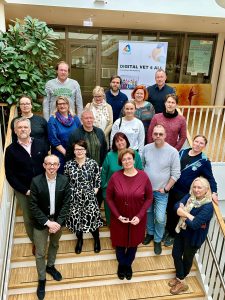The objective of the first LTTA was to obtain feedback about the layout and content from PR2, the Virtual Teachers’ room. For this, the target group was meant to comprise teachers, principals, and pedagogical leaders in educational and training institutions.
To achieve this, from the 20th to the 22th of September, the DIGITAL VET 4 ALL partners met at ATEC in Palmela, Portugal, for a joint train-the-trainer activity.
The activity started with an introduction from the project coordinator, Mika Heino, followed by a presentation of ATEC’s activities and the Portuguese Education and Training System, which included a walk around the facilities, in which partners had the opportunity to follow the training developed by ATEC and talk with some of the trainees.
After the visit to the premises, all 19 participants from partner organizations were guided through the exploration and use of the Virtual Teachers’ Lounge and its various tools. Following the hands-on experience of the first day, during the second day of the event, a SWOT analysis was conducted to gather structured feedback on the layout and content of the solution. The feedback, encompassing strengths, weaknesses, opportunities, and threats, was slated to serve as inputs for enhancing the development of PR2.
The afternoon of the second day was dedicated to PR1 Hybrid mobilities and its integration in the Virtual Teachers’ room and to the writing of Good Practices. During the third and last day of the LTTA, an evaluation and feedback session was held.
After the end of the works, partners had the opportunity to know a little bit better Lisbon and its history, with a very interesting guided tour, discovering several secrets about the city.
A train-the-trainer activity was developed at the RBZ am Schützenpark in Kiel, Germany. It involved 18 teachers from different countries to develop a hybrid mobility model. The outcome was transferable to the participating countries’ own education and training programs and partnerships. At the end of the seminar, a SWOT analysis was carried out and the results were used as input for improving the development. Based on prior preparation, the host organization had to provide prerequisites such as suitable premises and technical equipment. The meeting lasted three days and was divided into four main parts: Presentation of the host organization, the models of hybrid mobility, SWOT analyses, cultural tour. Thus, this event was not only a learning and training activity on one of the project outcomes, but also an opportunity for peers from different countries to get to know each other, learn about different cultures and educational systems and give feedback and recommendations to the project team for future work.
The last LTTA focused on piloting of the Blended Mobility Model and Teachers’ Lounge.
The Blended Mobility Model includes suggested actions before, during and after the physical mobility. The Teachers’ Lounge is divided finally to four parts: Wellbeing, Virtual Bookshelf, Advice Circle and Meeting Room.
As teachers and trainers, also project coordinators and students will be the final users, so this LTT activity was very important for creating the final output. All participants of the piloting filled in the feedback which helped us to make corrections and create missing parts. We got feedback from 57 participants (11 from Estonia, including the elderly care home Südamekodu director/workers and the representative of the education and youth board of the republic of Estonia).
Team of this project developed and made corrections in both outputs: Blended Mobility Model and Teachers’ Lounge. Also, we found that it is very important to connect both parts. If a teacher uses the Blended Mobility Model, they also have a possibility to find solutions from the Virtual bookshelf or ask questions through the Advice circle. So – developing these flexible connections was one of the tasks during this meeting and workshop.
Participating countries in Kuressaare meeting were 6 with 16 participants: Finland (Omnia, Samiedu, Vamia), Iceland, Portugal, Poland, Slovenia and Estonia.
The results of both piloted outcomes can be used across different subjects, but also for benchmarking and collaboration between educators, teachers and anyone interested in exchanging information on the use of digitalization in education.






